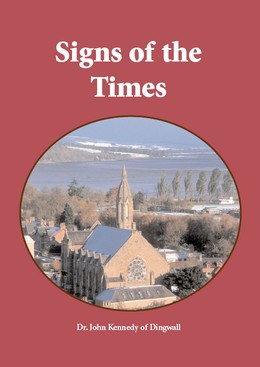Signs of the Times
by John Kennedy of Dingwall
More information about purchasing our publications can be found here.
Signs of the Times
by Rev. John Kennedy, D.D.
ISBN
0-9539241-4-9
66 pages; soft cover
£3.00

Readers of the Presbyterian Standard magazine may remember that in early issues we published eight articles originally written by Dr. John Kennedy of Dingwall for the Perthshire Courier in 1879 under the title "Signs of the Times." The original title was "The Present Cast and Tendency of Religious Thought and Feeling in Scotland," and it was very interesting to see how relevant these articles still are to the contemporary church scene. Now the James Begg Society has republished these articles in booklet form.
Introduction
by the James Begg Society Committee
I N her long history the church militant has been marked by frequent ebbs and flows in her vitality. She may experience decline in both doctrine and practice on occasion and and it is humbling to realise that no denomination is immune from such trends. The Lord Jesus Christ as King and Head of the church has promised that He will maintain His cause until the end of time, but He has not promised to any particular visible church that He will always preserve it against the destructive effects of sin and unbelief.We are in constant need of His gracious help.
One way in which the Lord gives help to His people is to raise up in their midst men who stand solidly for the truth and who are able to expose the errors of the day. Scottish Presbyterianism in the 19th century was blessed with a good number of faithful theologians, dignified statesmen, powerful preachers and tireless evangelists, but in one man all these abilities and more were seen together. In the galaxy of godly ministers which appeared at that time no star shone with a brighter and purer light than Dr. John Kennedy of Dingwall.
John Kennedy was born a son of the manse in 1819 at Killearnan in the Scottish Highlands where his father ministered in the Established Church of Scotland. He studied firstly at Aberdeen University and then in 1840 entered the Divinity Hall of the Established Church in the same city. Before he had completed his studies the Disruption of 1843 occurred and Kennedy, along with other promising students, was encouraged to present himself for licensing in what was now the Free Church of Scotland. In 1844 he was inducted to the newly-formed charge of Dingwall Free Church where he remained until his death in 1884.
It was Kennedy's lot to minister at a time when, as Principal John Macleod comments, "the definite out-and-out Calvinism of another day was going out of fashion," yet he proved to be the man for the hour. Observing towards the end of his life serious departures from orthodoxy in the three great Presbyterian denominations of the time, including his own beloved Free Church, Kennedy, who was always a contender for the faith, felt constrained to write the eight articles which appear once again in this booklet. His pen here is characteristically forceful but careful, sharply discriminating and yet free from prejudice.
What we have in this booklet are some much-needed warnings to the Churches of the Scottish Reformation. The biblical and confessional standpoint from which Kennedy described the declension which he saw in these Churches was becoming rare then and it is much rarer now. To many today, including those in the Reformed world, some of his statements will appear questionable, perhaps even heretical. That is no matter. We believe that a master of Israel is speaking here; we would do well to listen carefully to Kennedy and to learn from him. The Rev. Murdoch Campbell in Gleanings of Highland Harvest states the following concerning this eminent servant of God:
"It was but rarely that Dr.Kennedy preached under the mantle of a prophet. When he delivered himself of some pronouncement related to the Church of God, either in the far or near future, his words were well weighed. They were invariably the outcome of light obtained by means of prayer and the written Word. In one remarkable sermon on Isaiah xxvi. verse 20, he predicted the decline of evangelical preaching in the land. The beginnings of this falling away he had observed in his own day. The Lord, he remarked, would remove His loving witnesses, and few would arise to fill their place. False but popular teaching would displace the Gospel of free grace, and a generation without spiritual discernment would drink the poison like as a blind man would drink unwholesome water out of an unclean vessel. A spirit of worldliness would overcome the people, and the means of grace would be largely forsaken. God's Spirit would be grieved and therefore denied. In such a day the Lord's people would be few, feeble and hidden. This was a prediction which stood out in sharp contrast to the shallow optimism of those who in his day spoke of science, religion, and an ascending humanity, walking hand in hand to inaugurate an era of peace, moral progress, and spiritual life. But Time and God's Providence have fulfilled Dr. Kennedy's sombre vision – even in its very details."
These signs are fulfilled in our times.
— The James Begg Society, May 2003.






